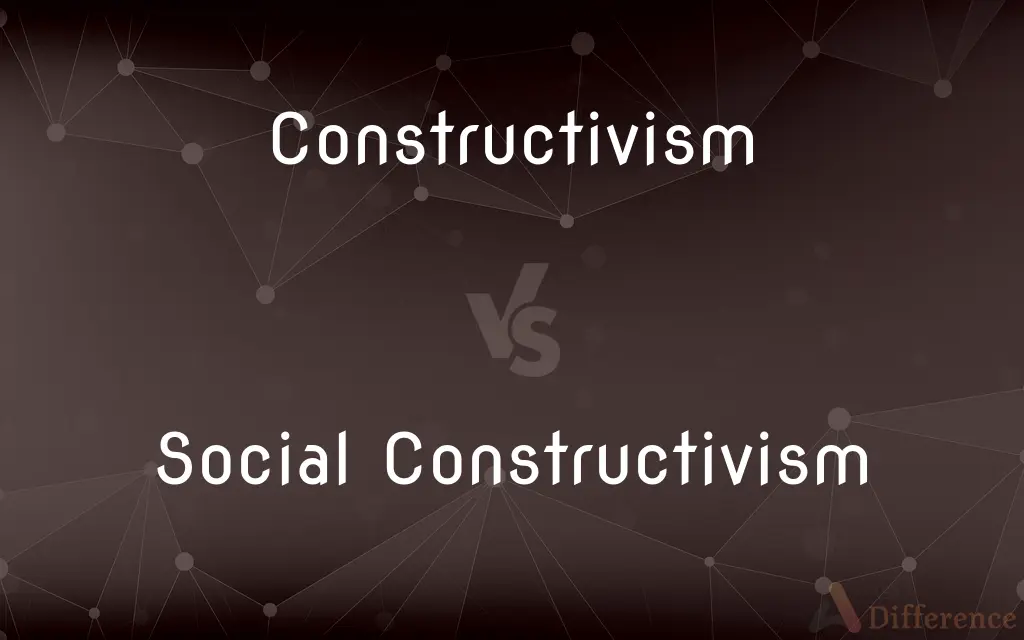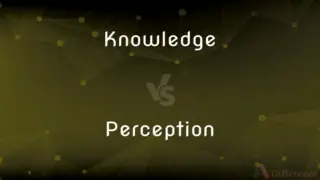Constructivism vs. Social Constructivism — What's the Difference?
By Tayyaba Rehman & Fiza Rafique — Published on July 6, 2024
Constructivism posits knowledge is built through experiences. Social constructivism adds the influence of social interactions and culture, viewing learning as collaborative.

Difference Between Constructivism and Social Constructivism
Table of Contents
ADVERTISEMENT
Key Differences
Constructivism posits that learners actively construct their own understanding and knowledge of the world, through experiencing things and reflecting on those experiences. It emphasizes the importance of personal experience and internal knowledge construction, suggesting that learning is unique and subjective to each individual.
Social Constructivism, a branch of constructivist theory introduced by Lev Vygotsky, adds a social dimension to knowledge construction. It argues that culture and social interaction are fundamental to the learning process, with knowledge being constructed through collaboration with others. Social constructivism emphasizes the importance of language, dialogue, and social interaction in the development of understanding and cognition.
Constructivism focuses on the learner's internal process of knowledge construction, while social constructivism highlights the influence of social interactions, suggesting that understanding is co-constructed through collaboration. Both theories agree on the active role of the learner in the learning process but differ in the emphasis placed on the social context and cultural tools available to the learner.
Educational strategies inspired by constructivism may include hands-on learning and discovery-based tasks, while those influenced by social constructivism often involve collaborative projects, discussion groups, and activities that require social negotiation and shared understanding.
Comparison Chart
Foundation
Learning as an individual process of constructing knowledge.
Learning as a social process, heavily influenced by interaction and culture.
ADVERTISEMENT
Key Proponent
Jean Piaget
Lev Vygotsky
Role of Experience
Emphasizes personal experiences in shaping understanding.
Focuses on shared experiences and social interactions.
Knowledge Construction
Individual activity based on internal reflection.
Collaborative activity shaped by social engagement and dialogue.
Cultural and Social Context
Less emphasis on the influence of culture and society.
Strong emphasis on the role of culture, language, and society in learning.
Educational Approach
Encourages independent exploration and discovery.
Promotes collaborative learning and dialogue among learners.
Compare with Definitions
Constructivism
Emphasizes problem-solving and critical thinking.
In a math class, students explore concepts through puzzles and real-world problems rather than rote memorization.
Social Constructivism
A theory that knowledge is constructed through social interaction and cultural context.
Language learners practice conversational skills in group settings, developing language proficiency through social use.
Constructivism
Focuses on the process of learning over the final product.
An art teacher assesses students on their creative process, not just the finished artwork.
Social Constructivism
Advocates for scaffolding by more knowledgeable others.
Teachers or peers provide support to learners at just the right level to stretch their understanding.
Constructivism
Encourages the use of active learning strategies.
Students engage in hands-on science labs to understand scientific principles.
Social Constructivism
Recognizes the influence of cultural tools in learning.
Students use technology and media reflective of their culture to research and present historical events.
Constructivism
Values the autonomy of the learner in the learning process.
Learners choose their own reading materials based on interests, fostering personalized understanding.
Social Constructivism
Emphasizes the role of language in learning.
Classroom discussions are used as a primary tool for exploring and understanding new concepts.
Constructivism
A learning theory that knowledge is constructed by the learner through experience.
A student learns about physics by conducting experiments, reflecting on outcomes, and adapting their understanding.
Social Constructivism
Highlights the importance of collaboration in learning.
Students work in groups to solve complex problems, learning from each other's perspectives.
Constructivism
A movement in modern art originating in Moscow in 1920 and characterized by the use of industrial materials such as glass, sheet metal, and plastic to create nonrepresentational, often geometric objects.
Constructivism
(arts) A Russian movement in modern art characterized by the creation of nonrepresentational geometric objects using industrial materials.
Constructivism
An abstractionist artistic movement in Russia after World War I; industrial materials were used to construct nonrepresentational objects
Common Curiosities
How does social constructivism explain learning differences among students?
Social constructivism suggests that differences in learning can be attributed to variations in social interactions, cultural backgrounds, and the availability of scaffolding.
How do constructivism and social constructivism view the teacher's role?
In constructivism, teachers facilitate experiences that allow for individual knowledge construction. In social constructivism, teachers also facilitate social interactions and discussions that build shared understanding.
Which is more effective, constructivism or social constructivism?
Effectiveness depends on the learning objectives, context, and learners' needs. Both approaches can be effective in different settings.
Can constructivism and social constructivism be integrated in teaching?
Yes, educators often blend both theories, allowing for both individual exploration and social interaction within learning experiences.
Are constructivism and social constructivism suitable for all subjects?
While broadly applicable, the practical implementation may vary by subject. Some subjects naturally lend themselves more to collaborative learning (social constructivism) or individual inquiry (constructivism).
What is the role of technology in constructivism and social constructivism?
Technology can support both theories by providing interactive and collaborative tools that facilitate individual exploration and social learning.
How do these theories address learners with special needs?
Both theories can be adapted to support diverse learners through differentiated instruction and scaffolding, tailored to individual or group needs.
How do constructivism and social constructivism impact assessment?
Both approaches advocate for assessments that consider the learning process, such as portfolios or projects, but social constructivism may place greater emphasis on collaborative outputs.
Can constructivism and social constructivism be applied outside of formal education?
Yes, these theories are applicable in informal learning environments, like museums or workshops, where learning is self-directed or occurs in groups.
What challenges might teachers face when applying these theories?
Challenges include designing appropriate learning activities, balancing structure with learner autonomy, and facilitating effective group dynamics.
Share Your Discovery

Previous Comparison
Low Beams vs. High Beams
Next Comparison
Knowledge vs. PerceptionAuthor Spotlight
Written by
Tayyaba RehmanTayyaba Rehman is a distinguished writer, currently serving as a primary contributor to askdifference.com. As a researcher in semantics and etymology, Tayyaba's passion for the complexity of languages and their distinctions has found a perfect home on the platform. Tayyaba delves into the intricacies of language, distinguishing between commonly confused words and phrases, thereby providing clarity for readers worldwide.
Co-written by
Fiza RafiqueFiza Rafique is a skilled content writer at AskDifference.com, where she meticulously refines and enhances written pieces. Drawing from her vast editorial expertise, Fiza ensures clarity, accuracy, and precision in every article. Passionate about language, she continually seeks to elevate the quality of content for readers worldwide.













































